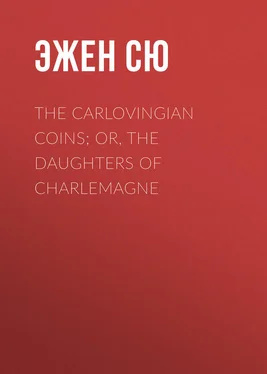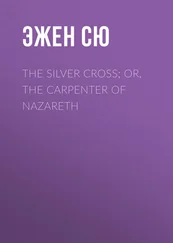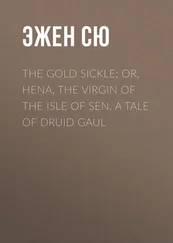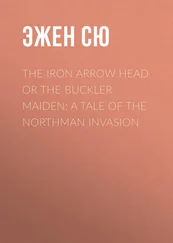Эжен Сю - The Carlovingian Coins; Or, The Daughters of Charlemagne
Здесь есть возможность читать онлайн «Эжен Сю - The Carlovingian Coins; Or, The Daughters of Charlemagne» — ознакомительный отрывок электронной книги совершенно бесплатно, а после прочтения отрывка купить полную версию. В некоторых случаях можно слушать аудио, скачать через торрент в формате fb2 и присутствует краткое содержание. Жанр: literature_19, foreign_antique, foreign_prose, на английском языке. Описание произведения, (предисловие) а так же отзывы посетителей доступны на портале библиотеки ЛибКат.
- Название:The Carlovingian Coins; Or, The Daughters of Charlemagne
- Автор:
- Жанр:
- Год:неизвестен
- ISBN:нет данных
- Рейтинг книги:3 / 5. Голосов: 1
-
Избранное:Добавить в избранное
- Отзывы:
-
Ваша оценка:
- 60
- 1
- 2
- 3
- 4
- 5
The Carlovingian Coins; Or, The Daughters of Charlemagne: краткое содержание, описание и аннотация
Предлагаем к чтению аннотацию, описание, краткое содержание или предисловие (зависит от того, что написал сам автор книги «The Carlovingian Coins; Or, The Daughters of Charlemagne»). Если вы не нашли необходимую информацию о книге — напишите в комментариях, мы постараемся отыскать её.
The Carlovingian Coins; Or, The Daughters of Charlemagne — читать онлайн ознакомительный отрывок
Ниже представлен текст книги, разбитый по страницам. Система сохранения места последней прочитанной страницы, позволяет с удобством читать онлайн бесплатно книгу «The Carlovingian Coins; Or, The Daughters of Charlemagne», без необходимости каждый раз заново искать на чём Вы остановились. Поставьте закладку, и сможете в любой момент перейти на страницу, на которой закончили чтение.
Интервал:
Закладка:
Eugène Sue
The Carlovingian Coins; Or, The Daughters of Charlemagne / A Tale of the Ninth Century
TRANSLATOR'S PREFACE
The Age of Charlemagne is the watershed of the history of the present era. The rough barbarian flood that poured over Western Europe reaches in that age a turning point of which Charlemagne is eminently the incarnation. The primitive physical features of the barbarian begin to be blunted, or toned down by a new force that has lain latent in him, but that only then begins to step into activity – the spiritual, the intellectual powers. The Age of Charlemagne is the age of the first conflict between the intellectual and the brute in the principal branches of the races that occupied Europe. The conflict raged on a national scale, and it raged in each particular individual. The colossal stature, physical and mental, of Charlemagne himself typifies the epoch. Brute instincts of the most primitive and savage, intellectual aspirations of the loftiest are intermingled, each contends for supremacy – and alternately wins it, in the monarch, in his court and in his people.
The Carlovingian Coins; or, The Daughters of Charlemagne is the ninth of the brilliant series of historical novels written by Eugene Sue under the title, The Mysteries of the People; or, History of a Proletarian Family Across the Ages . The age and its people are portrayed in a charming and chaste narrative, that is fittingly and artistically brought to a close by a veritable epopee – the Frankish conquest of Brittany, and, as fittingly, serves to introduce the next epopee – the Northman's invasion of Gaul – dealt with in the following story, The Iron Arrow Head; or, The Buckler Maiden .
Daniel de Leon.New York, May, 1905.
PART I.
AIX-LA-CHAPELLE
CHAPTER I.
AMAEL AND VORTIGERN
Towards the commencement of the month of November of the year 811, a numerous cavalcade was one afternoon wending its way to the city of Aix-la-Chapelle, the capital of the Empire of Charles the Great – an Empire that had been so rapidly increased by rapidly succeeding conquests over Germany, Saxony, Bavaria, Bohemia, Hungary, Italy and Spain, that Gaul, as formerly during the days of the Roman Emperors, was again but a province among the vast domains. The ambitious designs of Charles Martel had been realized. Childeric, the last scion of the Merovingian dynasty, had been got rid of. Martel's descendants took his seat, and now the Hammerer's grandson wielded the sceptre of Clovis over an immensely wider territory.
Eight or ten cavalry soldiers rode in advance of the cavalcade. A little apart from the smaller escort, four cavaliers ambled leisurely. Two of them wore brilliant armor after the German fashion. One of these was accompanied by a venerable old man of a martial and open countenance. His long beard, snow white as his hair that was half hidden under a fur cap, fell over his chest. He wore a Gallic blouse of grey wool, held around his waist by a belt, from which hung a long sword with an iron hilt. His ample hose of rough white fabric reached slightly below his knees and left exposed his tightly laced leather leggings, that ended in his boots whose heels were armed with spurs. The old man was Amael, who under the assumed Frankish name of Berthoald had, eighty years before, saved the life of Charles Martel at the battle of Poitiers against the Arabs, had declined the post offered him by Charles, as jailer of the last descendant of Clovis, and, finally, smitten by conscience, had renounced wealth and dignity under the Frankish enslavers of Gaul, and returned to his people and country of Brittany, or Armorica, as the Romans named it. Amael now touched his hundredth year. His great age and his somewhat portly stature notwithstanding, he still looked full of vigor. He handled with dexterity the black horse that he rode and whose spirit seemed no wise abated by the long road it had traveled. From time to time, Amael turned round upon his saddle in order to cast a look of paternal solicitude upon his grandson Vortigern, a lad of hardly eighteen years, who was accompanied by the other of the two Frankish warriors. The face of Vortigern, of exceptional beauty for a man, was framed in long chestnut ringlets, that, escaping from his scarlet coif, tumbled down below a chin that was as dainty as a woman's. His large blue eyes, fringed with lashes black as his bold arched eyebrows, had an air at once ingenuous and resolute. His red lips, shaded by the down of adolescence, revealed at every smile two rows of teeth white as enamel. A slightly aquiline nose, a fresh and pure complexion somewhat tanned by the sun, completed the harmonious make-up of the youth's charming visage. His clothes, made after the fashion of his grandfather's, differed from them only in a touch of elegance that bespoke a mother's hand, tenderly proud of her son's comely appearance. Accordingly, the blue blouse of the lad was ornamented around the neck, over the shoulders and at the extremities of the sleeves with embroideries of white wool, while a calfskin belt, from which hung a sword with polished hilt, encircled his supple waist. His linen hose half hid his deerskin leggings, that were tightly laced to his nervy limbs and rejoined his boots, made of tanned skin and equipped with large copper spurs that glistened like gold. Although his right arm was held in a scarf of some black material, Vortigern handled his horse with his left hand with as much ease as skill. For traveling companion he had a young warrior of agreeable mien, bold and mercurial, alert and frolicsome. The mobility of his face recalled in nothing the stolidity of the German. His name was Octave. Roman by birth, in appearance and character, his inexhaustible Southern wit often succeeded in unwrinkling the brow of his young companion. The latter, however, would soon again relapse into a sort of silent and somber revery. Thus for some time absorbed in sadness, he walked his horse slowly, when Octave broke in gaily in a tone of friendly reproach:
"By Bacchus! You still are preoccupied and silent."
"I am thinking of my mother," answered the youth, smothering a sigh. "I am thinking of my mother, of my sister and of my country."
"Come now; you should, on the contrary, chase away, such saddening thoughts. To the devil with sadness. Long live joy."
"Octave, gayness ill beseems a prisoner. I cannot share your light-heartedness."
"You are no prisoner, only a hostage. No bond binds you but your own word; prisoners, on the contrary, are led firmly pinioned to the slave market. Your grandfather and yourself ride freely, with us for your companions, and we are escorting you, not to a slave market, but to the palace of the Emperor Charles the Great, the mightiest monarch of the whole world. Finally, prisoners are disarmed; your grandfather as well as yourself carry your swords."
"Of what use are our swords now to us?" replied Vortigern with painful bitterness. "Brittany is vanquished."
"Such are the chances of war. You bravely did your duty as a soldier. You fought like a demon at the side of your grandfather. He was not wounded, and you only received a lance-thrust. By Mars, the valiant god of war, your blows were so heavy in the melee that you should have been hacked to pieces."
"We would not then have survived the disgrace of Armorica."
"There is no disgrace in being overcome when one has defended himself bravely – above all when the forces that one resisted and decimated, were the veteran bands of the great Charles."
"Not one of your Emperor's soldiers should have escaped."
"Not one?" merrily rejoined the young Roman. "What, not even myself? Not even I, who take such pains to be a pleasant traveling companion, and who tax my eloquence to entertain you? Verily, you are not at all grateful!"
Читать дальшеИнтервал:
Закладка:
Похожие книги на «The Carlovingian Coins; Or, The Daughters of Charlemagne»
Представляем Вашему вниманию похожие книги на «The Carlovingian Coins; Or, The Daughters of Charlemagne» списком для выбора. Мы отобрали схожую по названию и смыслу литературу в надежде предоставить читателям больше вариантов отыскать новые, интересные, ещё непрочитанные произведения.
Обсуждение, отзывы о книге «The Carlovingian Coins; Or, The Daughters of Charlemagne» и просто собственные мнения читателей. Оставьте ваши комментарии, напишите, что Вы думаете о произведении, его смысле или главных героях. Укажите что конкретно понравилось, а что нет, и почему Вы так считаете.












